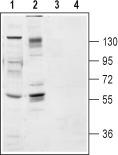Ntrk2 Rabbit Polyclonal Antibody
Other products for "Ntrk2"
Specifications
| Product Data | |
| Applications | FC, IHC, WB |
| Recommended Dilution | WB: 1:200-1:2000; IHC: 1:100-1:3,000; FC: 1:50-1:600 |
| Reactivities | Human, Mouse, Rat |
| Host | Rabbit |
| Clonality | Polyclonal |
| Immunogen | Peptide (C)RLEPNSIDPENITE, corresponding to amino acid residues 57-70 of rat TrkB . Extracellular domain. |
| Formulation | Lyophilized. Concentration before lyophilization ~0.8mg/ml (lot dependent, please refer to CoA along with shipment for actual concentration). Buffer before lyophilization: Phosphate buffered saline (PBS), pH 7.4, 1% BSA, 0.025% NaN3. |
| Purification | Affinity purified on immobilized antigen. |
| Conjugation | Unconjugated |
| Storage | Store at -20°C as received. |
| Stability | Stable for 12 months from date of receipt. |
| Gene Name | neurotrophic receptor tyrosine kinase 2 |
| Database Link | |
| Background | BDNF and NT-4 belong to the neurotrophin family which also includes NGF and NT-3. These neurotrophins bind two groups of receptors. The p75NTR receptor is common to all four neurotrophins and is a member of the tumor necrosis factor receptor family. The tropomyosin-related kinase (Trk) receptors are receptor tyrosine kinases (RTKs) and three receptors form this family: TrkA, TrkB, and TrkC.As mentioned above, the p75NTR receptor binds to all neurotrophins with similar affinities while the Trk receptors are the ones to display the selectivity for the neurotrophins. TrkA is activated by NGF binding, TrkB by that of BDNF and NT-4, while TrkC is stimulated by the binding of NT-3.All three Trk receptors are highly expressed in the mammalian brain in very distinct regions and are also expressed in the peripheral nervous system.Cholinergic neurons in the basal forebrain exclusively express TrkA, while TrkB and TrkC are highly expressed in the hippocampus. Motor and sensory neurons in the peripheral nervous system express Trk receptors. Interestingly, Trk receptors are not essential for development, but knockout mice die shortly after birth. Indeed, TrkB-deficient mice demonstrate a significant decrease in motor neurons and synaptogenesis.Trk receptors have many motifs in the extracellular region, including cell-adhesion domains, three tandem leucine rich motifs flanked by two clusters of cysteines. In the membrane proximal region of the receptor there are also two immunoglobulin-like domains. The binding of neurotrophins to Trk receptors promotes receptor dimerization resulting in kinase activation. Activated Trk receptors then phosphorylate a cascade of signaling molecules including the Ras/ERK, PI3K/Akt pathways and PLC-g1. Activated Trk receptors also create internal docking sites for other signaling adaptor proteins to bind to. Splice variants of TrkA, TrkB and TrkC have been observed. These splice isoforms are mainly affected in the tyrosine kinase domain of the receptor lying in the cytoplasm. Endocytosis is an important signaling trait of Trk receptors.Following neurotrophin binding to the Trk receptor, the receptor complex is then internalized via endocytosis in order to terminate signaling. However, in the axonal compartment of neurons the internalization process of the neurotrophin complexed to the receptor is part of the signaling process and is important for activating transcription processes in the nucleus. |
| Synonyms | GP145-TrkB; OTTHUMP00000021573; OTTHUMP00000021574; OTTHUMP00000021576; OTTHUMP00000021577; Trk-B; TRKB |
| Reference Data | |
Documents
| Product Manuals |
| FAQs |
{0} Product Review(s)
0 Product Review(s)
Submit review
Be the first one to submit a review
Product Citations
*Delivery time may vary from web posted schedule. Occasional delays may occur due to unforeseen
complexities in the preparation of your product. International customers may expect an additional 1-2 weeks
in shipping.






























































































































































































































































 Germany
Germany
 Japan
Japan
 United Kingdom
United Kingdom
 China
China






